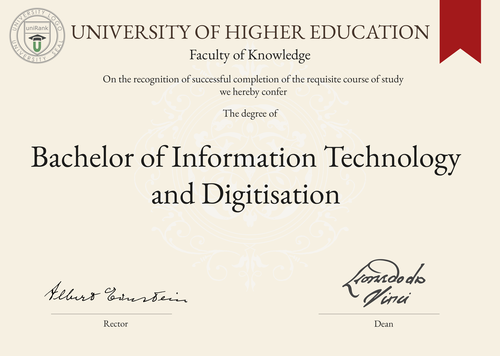
Bachelor of Information Technology and Digitisation (BITD)
Guide to Bachelor of Information Technology and Digitisation Program/Course/Degree
Bachelor of Information Technology and Digitisation (BITD)

Program Name:
Bachelor of Information Technology and DigitisationProgram or Degree abbreviation:
BITDDuration range:
3-4 yearsTuition range:
Varies depending on the country and universityOverview:
The Bachelor of Information Technology and Digitisation program is designed to provide students with a comprehensive understanding of information technology and its applications in various industries. It focuses on developing technical skills, problem-solving abilities and critical thinking necessary for a successful career in the digital world.Curriculum Overview by year:
- Year 1: Introduction to Information Technology, Programming Fundamentals, Database Management, Web Development - Year 2: Data Structures and Algorithms, Systems Analysis and Design, Network Security, Software Engineering - Year 3: Artificial Intelligence, Cloud Computing, Mobile Application Development, Project Management - Year 4: Elective courses, Internship/Industry Placement, Capstone ProjectKey Components:
- Programming languages (Java, Python, C++) - Database management systems - Web development - Network security - Artificial intelligence - Cloud computing - Mobile application development - Project managementCareer Prospects:
Graduates of the Bachelor of Information Technology and Digitisation program can pursue various career paths, including: - Software developer - Web developer - Database administrator - Network administrator - IT consultant - Systems analyst - Data analyst - Project managerSalary Expectations:
Salaries for graduates of the Bachelor of Information Technology and Digitisation program can vary depending on factors such as location, industry and experience. On average, entry-level positions may range from $50,000 to $70,000 per year, with potential for higher salaries as one gains experience and expertise. For a more accurate understanding of salary expectations, you can utilize the Job Sites Search Engine, from our sister site jobRank, which searches over 4,600 job sites worldwide. Make sure to specify not only the job title but also the country you are interested in.Conclusions:
It is important to note that the duration, tuition fees, curriculum, key components, career prospects and salary expectations of the Bachelor of Information Technology and Digitisation program can vary depending on the chosen country or location of study, as well as the university offering the program. Prospective students are encouraged to research and compare different universities and countries to find the best fit for their educational and career goals. Visitors can search for where this specific degree, Bachelor of Information Technology and Digitisation, is offered anywhere in the world through the uniRank World Universities Search Engine.World Universities Search Engine
search for Bachelor of Information Technology and Digitisation (BITD) and add the Location (country, state etc.) or specific University you are interested in studying at.
Query examples:
- Bachelor of Information Technology and Digitisation (BITD) United States
- Bachelor of Information Technology and Digitisation (BITD) United Kingdom online
- Bachelor of Information Technology and Digitisation (BITD) Australia international students
- Bachelor of Information Technology and Digitisation (BITD) University of California
- Bachelor of Information Technology and Digitisation (BITD) University of London tuition fees
- Bachelor of Information Technology and Digitisation (BITD) University of Sydney scholarships
Share Program/Course
Interesting? Share this program/course/degree info with your friends now.